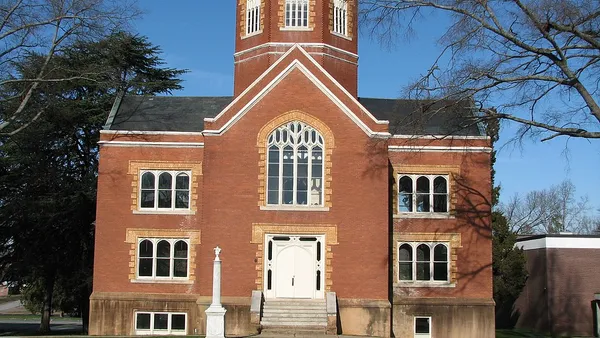Dive Brief:
-
College faculty across the U.S. are organizing to force administrators to allow them to teach remotely this fall. They're also rejecting budget cuts and layoffs related to the global health crisis.
-
Instructors in at least one system, the City Colleges of Chicago, threatened to strike if administrators did not improve safety protocols, local media reported.
-
The complaints come as officials prepare to reopen campuses nationwide for the fall, a decision that has prompted concerns about the coronavirus spreading.
Dive Insight:
Faculty balked when institutions began announcing plans to reopen campuses in the fall, citing their fears about contracting the disease while working in classrooms.
Broadly, faculty have encouraged each other to take necessary steps to preserve their health. Christopher Lee, a history professor at Lafayette College, in Pennsylvania, wrote in an essay in the Boston Review in April that colleges could give faculty the option of not working in certain conditions, shifting teaching loads to later semesters or a combination of these options.
"This range of options could be an organizational headache for registrars, but it could also map a middle ground between closing for an entire semester and re-opening as normal with the risk of having to shut down abruptly again," Lee wrote.
Some, like the faculty and staff at the City Colleges system, are refusing to work if their demands aren't met. Faculty at the seven-member community college system haven't gone on strike since 2004, local media reported.
An activist group at the University of North Carolina at Chapel Hill urged white tenured faculty to strike if the system didn't go remote in the fall, citing the disproportionate impact the decision would have on employees of color. The university began in-person classes Monday.
Meanwhile, the pandemic has squeezed colleges' budgets, leading them to consider cuts that faculty view as untenable. Some instructors have accepted reductions, such as those at the Rhode Island School of Design, whose faculty came to a deal with officials last month. It avoids layoffs of full-time professors but imposes some salary reductions and suspends the college's contribution to individual employee retirement plans for a year, The Providence Journal reported.
The University of Akron, in Ohio, also announced layoffs of nearly 100 full-time faculty, but the union membership there rejected the contract.
A spokesperson for the American Association of University Professors (AAUP) declined Education Dive's interview request, referring instead to the group's webpage dedicated to the sector's response to the virus.
AAUP's principles and standards on the pandemic state that colleges should not "circumvent widely accepted principles of academic governance." Faculty members have said the health crisis has eroded their communication with administrators, some of whom have ignored the traditional tenants of shared governance, instructors say.
Less revenue and, in the case of public universities, state budget cuts will "make it impossible" to maintain compensation and employment levels, David Attis, managing director of research at consulting firm EAB wrote in an email, adding that "difficult trade-offs" will be unavoidable.
"The best and most sustainable solutions will come from administrators, faculty, and staff working together and acknowledging that there are no easy answers," Attis wrote.














